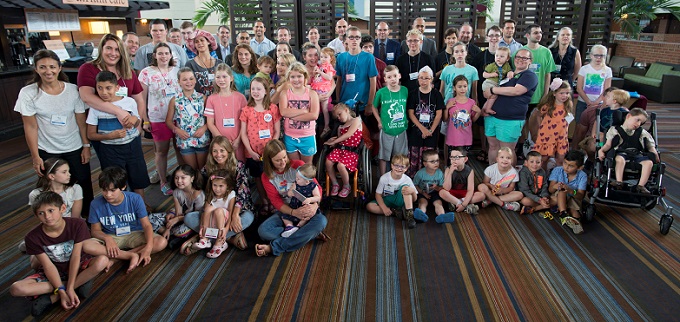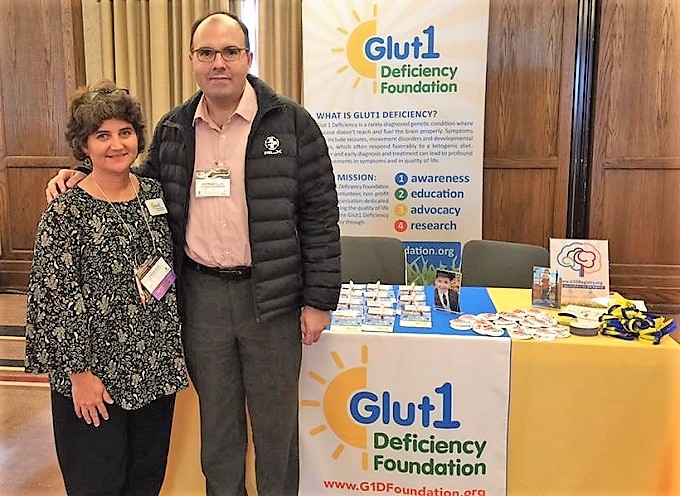Glut1 Deficiency Foundation supports ongoing research at UT Southwestern

The Glut 1 Deficiency Foundation holds an annual conference for families to meet, share, and learn from world leaders in research and care for G1D. Family members appreciate the chance to be with others who understand this rare brain disease and are able to build strong support systems.
By Erin Prather Stafford
Imagine playing with your new baby on a quiet afternoon. His eyes suddenly move in a way you have never seen before. You take him to the pediatrician, who has no explanation.
Months later, your child experiences a severe seizure. His muscles contract and he loses consciousness. Many trips to different specialists finally result in a diagnosis of Glucose Transporter Type 1 Deficiency Syndrome (G1D), a genetic disorder that stops glucose from being transported properly into the brain and “starves” the brain of the energy it needs to grow and function. Your baby would become one of only a few hundred patients diagnosed with G1D worldwide. Experts believe that there are thousands more undiagnosed infants, children, and adults.

Dr. Juan Pascual accepted an invitation to speak at the first family conference in 2009, and he has attended every conference since then. Conferences give the medical experts a chance to interact with families, as well as each other to share thoughts and ideas.
Dr. Juan Pascual, Associate Professor of Neurology and Neurotherapeutics, Pediatrics, and Physiology at UT Southwestern Medical Center, is one of the few actively practicing pediatric neurologists in the U.S. who is also active in the laboratory, working to develop better treatments for G1D. Since 2012, he has received gifts totaling more than $235,000 to support his research efforts from the Glut1 Deficiency Foundation. The organization exists to improve the lives of those in the G1D community through increased awareness, improved education, advocacy, and funding for much-needed research for this rare brain disorder.
“Dr. Pascual has proven time and again that he is deeply committed to the G1D community, both through the attentive and compassionate care he gives his patients in clinic and also through the innovative and impactful research he leads in his lab,” said Glenna Steele, Executive Director for the Glut1 Deficiency Foundation. “He is tuned in to the challenges and difficulties that G1D patients and families face and is a devoted and engaged advocate for greater understanding, better treatments, and improved quality of life.”
The average age of diagnosis for G1D is between five and six years of age. Some signs and symptoms – including seizures, movement disorders, speech and language disorders, and developmental delays – may vary considerably from one patient to another, change, and evolve over time. Children with G1D are usually unable to learn beyond an elementary school level or live independently as adults.
There is no cure for G1D, and the only option to treat symptoms and limit seizures is a high-fat, low-carbohydrate ketogenic diet. The diet works in about two-thirds of patients. It is most effective against the seizures that 90 percent of G1D patients experience, but the movement and cognitive challenges remain less responsive.
A 2017 study led by Dr. Pascual at UT Southwestern’s Peter O’Donnell Jr. Brain Institute offered novel insight into how a newly designed diet could help children cope with G1D. Published in JAMA Neurology, the study tested edible oil from castor beans that smaller studies had indicated could improve cognitive abilities in patients. Relying on data from a worldwide registry Dr. Pascual created in 2013, the study also found that a modified Atkins diet that includes less fat and slightly more carbohydrates than the standard ketogenic diet helped reduce seizures and improved the patients’ long-term health. It also determined earlier diagnosis and treatment of the disease improved overall prognosis.
Additionally, Dr. Pascual is overseeing national clinical trials that are testing whether triheptanoin (C7) oil improves the intellect of G1D patients by providing their brains an alternative fuel to glucose. He is optimistic the FDA will be convinced to classify C7 as a medical food (instead of a drug) so it can be broadly available in the United States at a reasonable price.
“This funding from the Glut1 Deficiency Foundation has been used to attract and fund several early career researchers at UT Southwestern who wish to make Glut1 their field of interest,” he said. “We’ve uncovered the most common treatments used for Glut1 worldwide by analyzing the G1D patient registry and are studying the specific cells in the brain responsible for seizures. We hope that our research with C7 will make an additional treatment option possible that either works with a ketogenic diet or makes the diet no longer necessary. Presently there are two major breakthroughs on their way to publication in medical and scientific journals, which would not have been possible without the Foundation’s help.”
Through Dr. Pascual’s research, Ms. Steele and the Foundation have already witnessed a fundamental shift in the way the mechanisms of G1D are understood, which has opened the door to additional ideas for research avenues and potential treatments. They look to the future with confidence and hope for families living with G1D.
“We know that every idea and every research question Dr. Pascual explores raises the bar and moves everything forward,” said Ms. Steele. “The support we provide for his research reaps immeasurable dividends for our entire patient community.”
Dr. Juan Pascual holds the Once Upon a Time Foundation Professorship in Pediatric Neurologic Diseases.